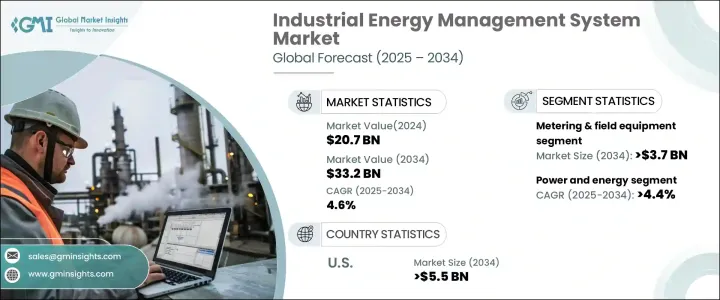
|
시장보고서
상품코드
1684818
산업용 에너지 관리 시스템 시장 기회, 성장 촉진요인, 산업 동향 분석, 예측(2025-2034년)Industrial Energy Management System Market Opportunity, Growth Drivers, Industry Trend Analysis, and Forecast 2025 - 2034 |
||||||
세계의 산업용 에너지 관리 시스템 시장 2024년 시장 규모는 207억 달러로 평가되었고, 2034년까지의 CAGR은 4.6%를 나타낼 것으로 예측되고 있습니다.
이 성장은 산업 부문 전반에서 에너지 효율과 지속가능성에 대한 노력에 주목을 받고 있다는 배경이 있습니다. 산업용 에너지 관리 시스템은 에너지 소비를 실시간으로 모니터링, 제어, 최적화하고 운영 비용을 크게 줄이고 환경에 미치는 영향을 줄이는 힘을 기업에 제공합니다. IoT 기술의 급속한 진보는 에너지 비용의 상승과 엄격한 환경 규제와 함께 산업용 에너지 관리 시스템를 업무에 필수적인 요소로 채택하도록 각 산업을 뒷받침하고 있습니다. 게다가 세계 기업들이 탄소 중립과 지속가능성의 야심적인 목표 달성을 목표로 하고 있기 때문에 이러한 시스템은 비효율성을 파악하고 생산성을 높이고 배출량을 줄이는 필수적인 도구가 되고 있습니다.

산업 부문은 에너지 가격 변동, 더 깨끗한 에너지 원에 대한 수요 증가, 구식 에너지 및 인프라 현대화의 필요성으로 인해 전례없는 과제에 직면해 있습니다. 각국 정부가 보다 엄격한 환경 컴플라이언스 기준을 시행하고 있는 가운데, 산업계는 이러한 규제상의 요구를 충족하는 동시에 에너지 사용을 최적화하기 위해 산업용 에너지 관리 시스템를 채용하고 있습니다. 이러한 시스템이 제공하는 실시간 데이터 분석을 통해 조직은 실용적인 통찰력을 얻을 수 있어 의사결정을 개선하고 장기적인 비용을 절감할 수 있습니다. 또한 AI, 머신러닝, 스마트센서 등의 첨단기술의 통합으로 산업용 에너지 관리 시스템의 채용이 가속화되고 있으며, 산업계는 에너지 관리 전략을 변화시켜 보다 지속가능하고 회복력 있는 사업으로 이행할 수 있습니다.
| 시장 범위 | |
|---|---|
| 시작 연도 | 2024년 |
| 예측 연도 | 2025-2034년 |
| 시작 금액 | 207억 달러 |
| 예측 금액 | 332억 달러 |
| CAGR | 4.6% |
구성 요소별로 미터링 및 필드 장비 부문은 2034년까지 37억 달러를 창출할 것으로 예상됩니다. 이 분야는 효과적인 에너지 최적화의 기초를 형성하는 정확한 에너지 소비 데이터를 제공하는 데 필수적입니다. 산업계가 에너지의 투명성을 높이려고 노력하는 가운데, 고도의 계측기기와 현장기기에 대한 수요는 증가 경향에 있습니다. 이러한 컴포넌트에 통합된 스마트 기술은 기업의 채택을 더욱 촉진하고 전반적인 효율성을 최적화하면서 에너지 사용을 보다 효과적으로 추적, 측정 및 분석할 수 있게 합니다.
용도별로는 전력 및 에너지 분야가 예측 기간 동안 CAGR 4.4%를 나타낼 것으로 예상되고 있습니다. 효율적인 에너지 분배와 저장 솔루션에 대한 요구가 증가함에 따라 이 분야에서 산업용 에너지 관리 시스템 수요를 추진하고 있습니다. 이러한 시스템은 다양한 에너지원의 원활한 통합을 가능하게 하고, 에너지 낭비를 최소화하고, 에너지 저장 및 배전 네트워크의 효율을 향상시킵니다. 스마트 에너지 솔루션으로의 전환은 보다 깨끗하고 효율적인 에너지 기술을 채택하는 보다 광범위한 세계 동향과 일치합니다.
미국의 산업용 에너지 관리 시스템 시장은 산업 프로세스에서 데이터 주도 의사 결정의 채택 확대로 2034년까지 55억 달러를 창출할 것으로 전망됩니다. 고급 분석 도구를 갖춘 산업용 에너지 관리 시스템는 에너지 사용을 최적화하고, 업무 효율성을 높이고, 상당한 비용 절감을 실현합니다. 산업계가 에너지 인프라 근대화와 야심찬 지속가능성 목표 달성에 주력하는 가운데 이러한 시스템의 채용은 기세를 늘리고 있습니다. 게다가 에너지 효율성과 청정 기술의 이용을 촉진하는 연방 정부와 주 수준의 인센티브는 이 지역 시장 성장을 더욱 강화하고 있습니다.
목차
제1장 조사 방법과 조사 범위
- 시장의 정의
- 기본 추정과 계산
- 예측 계산
- 데이터 소스
제2장 주요 요약
제3장 업계 인사이트
- 생태계 분석
- 규제 상황
- 업계에 미치는 영향요인
- 성장 촉진요인
- 업계의 잠재적 위험 및 과제
- 성장 가능성 분석
- Porter's Five Forces 분석
- PESTEL 분석
제4장 경쟁 구도
- 전략 대시보드
- 혁신과 지속가능성의 전망
제5장 시장 규모와 예측 : 구성 요소별(2021-2034년)
- 주요 동향
- 계량 및 현장 기기
- 하드웨어
- 소프트웨어
- 네트워크 장비
- 제어 시스템
- 센서
- 기타
제6장 시장 규모와 예측 : 용도별(2021-2034년)
- 주요 동향
- 전력 및 에너지
- IT
- 제조업
- 기업
- 헬스케어
- 기타
제7장 시장 규모와 예측 : 지역별(2021-2034년)
- 주요 동향
- 북미
- 미국
- 캐나다
- 멕시코
- 유럽
- 독일
- 영국
- 이탈리아
- 스페인
- 러시아
- 아시아태평양
- 중국
- 일본
- 인도
- 호주
- 한국
- 중동 및 아프리카
- 사우디아라비아
- 아랍에미리트(UAE)
- 남아프리카
- 라틴아메리카
- 브라질
- 아르헨티나
제8장 기업 프로파일
- Alarm.com
- Alphabet
- Bosch
- Comcast
- Ecobee
- EcoFactor
- Energyhub
- General Electric
- Honeywell
- Ingersoll Rand
- Johnson Controls
- Nest Labs
- NX Technologies
- Panasonic
- Schneider Electric
- Siemens
- Vivint
The Global Industrial Energy Management System Market was valued at USD 20.7 billion in 2024 and is forecasted to grow at a CAGR of 4.6% through 2034. This growth is fueled by a surging focus on energy efficiency and sustainability initiatives across industrial sectors. Industrial energy management systems are empowering businesses to monitor, control, and optimize energy consumption in real-time, significantly reducing operational costs and mitigating environmental impact. The rapid advancements in IoT technologies, coupled with rising energy costs and stringent environmental regulations, are pushing industries to adopt IEMS as an integral part of their operations. Additionally, as companies worldwide aim to achieve ambitious carbon neutrality and sustainability goals, these systems are becoming essential tools for identifying inefficiencies, improving productivity, and reducing emissions.

The industrial sector faces unprecedented challenges due to fluctuating energy prices, increasing demand for cleaner energy sources, and the need to modernize outdated energy infrastructures. With governments enforcing stricter environmental compliance standards, industries are adopting IEMS to meet these regulatory demands while simultaneously optimizing their energy use. Real-time data analytics offered by these systems allow organizations to gain actionable insights, leading to improved decision-making and long-term cost savings. Furthermore, the integration of advanced technologies such as AI, machine learning, and smart sensors is accelerating the adoption of these systems, enabling industries to transform their energy management strategies and transition toward more sustainable and resilient operations.
| Market Scope | |
|---|---|
| Start Year | 2024 |
| Forecast Year | 2025-2034 |
| Start Value | $20.7 Billion |
| Forecast Value | $33.2 Billion |
| CAGR | 4.6% |
By component, the metering and field equipment segment is projected to generate USD 3.7 billion by 2034. This segment is vital in delivering precise energy consumption data, which forms the foundation for effective energy optimization. As industries strive to enhance energy transparency, demand for advanced metering devices and field equipment is on the rise. Smart technologies integrated into these components are further driving their adoption, enabling businesses to track, measure, and analyze energy use more effectively while optimizing overall efficiency.
In terms of application, the power and energy sector is expected to expand at a CAGR of 4.4% during the forecast period. The increasing need for efficient energy distribution and storage solutions is driving demand for IEMS in this domain. These systems enable seamless integration of diverse energy sources, minimize energy waste, and improve the efficiency of energy storage and distribution networks. The shift toward smart energy solutions aligns with the broader global trend of adopting cleaner and more efficient energy technologies.
The U.S. industrial energy management system market is poised to generate USD 5.5 billion by 2034, driven by the growing adoption of data-driven decision-making in industrial processes. IEMS equipped with advanced analytics tools empowers businesses to optimize energy usage, enhance operational efficiency, and achieve significant cost savings. As industries focus on modernizing energy infrastructures and meeting ambitious sustainability targets, the adoption of these systems continues to gain momentum. Additionally, federal and state-level incentives promoting energy efficiency and the use of clean technologies are further bolstering market growth in the region.
Table of Contents
Chapter 1 Methodology & Scope
- 1.1 Market definitions
- 1.2 Base estimates & calculations
- 1.3 Forecast calculation
- 1.4 Data sources
- 1.4.1 Primary
- 1.4.2 Secondary
- 1.4.2.1 Paid
- 1.4.2.2 Public
Chapter 2 Executive Summary
- 2.1 Industry synopsis, 2021 – 2034
Chapter 3 Industry Insights
- 3.1 Industry ecosystem analysis
- 3.2 Regulatory landscape
- 3.3 Industry impact forces
- 3.3.1 Growth drivers
- 3.3.2 Industry pitfalls & challenges
- 3.4 Growth potential analysis
- 3.5 Porter's analysis
- 3.5.1 Bargaining power of suppliers
- 3.5.2 Bargaining power of buyers
- 3.5.3 Threat of new entrants
- 3.5.4 Threat of substitutes
- 3.6 PESTEL analysis
Chapter 4 Competitive landscape, 2024
- 4.1 Strategic dashboard
- 4.2 Innovation & sustainability landscape
Chapter 5 Market Size and Forecast, By Component, 2021 – 2034 (USD Million)
- 5.1 Key trends
- 5.2 Metering & field equipment
- 5.3 Hardware
- 5.4 Software
- 5.5 Networking device
- 5.6 Control systems
- 5.7 Sensors
- 5.8 Others
Chapter 6 Market Size and Forecast, By Application, 2021 – 2034 (USD Million)
- 6.1 Key trends
- 6.2 Power & energy
- 6.3 IT
- 6.4 Manufacturing
- 6.5 Enterprise
- 6.6 Healthcare
- 6.7 Others
Chapter 7 Market Size and Forecast, By Region, 2021 – 2034 (USD Million)
- 7.1 Key trends
- 7.2 North America
- 7.2.1 U.S.
- 7.2.2 Canada
- 7.2.3 Mexico
- 7.3 Europe
- 7.3.1 Germany
- 7.3.2 UK
- 7.3.3 Italy
- 7.3.4 Spain
- 7.3.5 Russia
- 7.4 Asia Pacific
- 7.4.1 China
- 7.4.2 Japan
- 7.4.3 India
- 7.4.4 Australia
- 7.4.5 South Korea
- 7.5 Middle East & Africa
- 7.5.1 Saudi Arabia
- 7.5.2 UAE
- 7.5.3 South Africa
- 7.6 Latin America
- 7.6.1 Brazil
- 7.6.2 Argentina
Chapter 8 Company Profiles
- 8.1 Alarm.com
- 8.2 Alphabet
- 8.3 Bosch
- 8.4 Comcast
- 8.5 Ecobee
- 8.6 EcoFactor
- 8.7 Energyhub
- 8.8 General Electric
- 8.9 Honeywell
- 8.10 Ingersoll Rand
- 8.11 Johnson Controls
- 8.12 Nest Labs
- 8.13 NX Technologies
- 8.14 Panasonic
- 8.15 Schneider Electric
- 8.16 Siemens
- 8.17 Vivint















